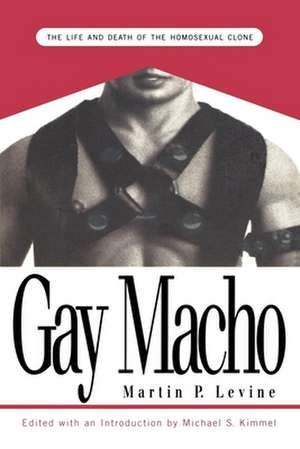Gay Macho – The Life and Death of the Homosexual Clone
Autor Martin P. Levine, Michael Kimmelen Limba Engleză Paperback – 31 dec 1997
Preț: 240.49 lei
Nou
Puncte Express: 361
Preț estimativ în valută:
46.02€ • 47.78$ • 38.38£
46.02€ • 47.78$ • 38.38£
Carte tipărită la comandă
Livrare economică 22 martie-05 aprilie
Preluare comenzi: 021 569.72.76
Specificații
ISBN-13: 9780814746950
ISBN-10: 0814746950
Pagini: 274
Dimensiuni: 152 x 228 x 15 mm
Greutate: 0.38 kg
Ediția:New.
Editura: MI – New York University
ISBN-10: 0814746950
Pagini: 274
Dimensiuni: 152 x 228 x 15 mm
Greutate: 0.38 kg
Ediția:New.
Editura: MI – New York University
Recenzii
"This book seems destined to become a eulogy for the important contributions that Martin Levine made to the sociological study of sexuality, gender, and AIDS."Men and Masculinities
"This book seems destined to become a eulogy for the important contributions that Martin Levine made to the sociological study of sexuality, gender, and AIDS."--Men and Masculinities
"This book seems destined to become a eulogy for the important contributions that Martin Levine made to the sociological study of sexuality, gender, and AIDS."--Men and Masculinities
Textul de pe ultima copertă
Before gay liberation, gay men were usually perceived as failed men - "inverts", men trapped in women's bodies. The 1970s saw a radical shift in gay male culture, as a male homosexuality emerged that embraced a more traditional masculine ethos. The gay "clone", a muscle-bound, sexually free, hard-living Marlboro man, appeared in the gay enclaves of major cities, changing forever the face of gay male culture. Gay Macho presents the ethnography of this homosexual clone. Martin P. Levine, a pioneer of the sociological study of homosexuality, was among the first social scientists to map the emergence of a gay community and this new style of gay masculinity. Levine was a participant in as well as an observer of gay culture in the 1970s, and this perspective allowed him to capture the true flavor of what it was like to be a gay man before AIDS. Later chapters, based on Levine's pathbreaking empirical research, explore some of the epidemiological and social consequences of the AIDS epidemic on this particular substratum of the gay community. Although Levine explicitly rejects pathologizing the gay men afflicted with HIV, his work develops a scathing, feminist-inspired critique of masculinity, whether practiced by gay men or straight men.













